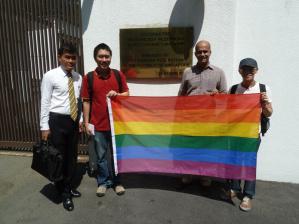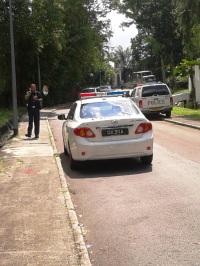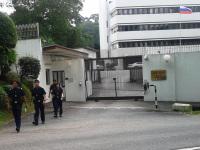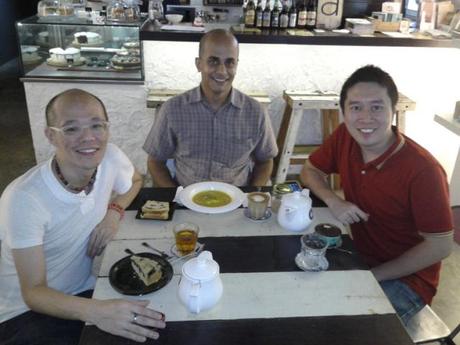 The homophobic violence in Russia (including two murders) which followed the enactment of laws prohibiting the promotion of ‘non traditional sexuality’ among minors resulted in outrage among LGBT groups all over the world.
The homophobic violence in Russia (including two murders) which followed the enactment of laws prohibiting the promotion of ‘non traditional sexuality’ among minors resulted in outrage among LGBT groups all over the world.
International protests have been organised to show solidarity with the Russian LGBT community which is being persecuted by anti-gay groups with the collusion of the government.
The LGBT community in Singapore came together at Hong Lim Park last Saturday (24 August), in a show of support for our Russian brothers and sisters. Our petition collected a total of 200 signatures which we intended to deliver to the Russian Embassy.
Last week, we contacted the Embassy to inform them of this and this was their reply:
“The Embassy has received and considered your request for a meeting with an Embassy official with the purpose of submitting a petition from Singapore’s LGBT community.
We believe that your protest is prompted by gross misconception and is ill-advised. You have misconstrued developments in Russia.
First of all, we want to remind that discrimination of any minority is legally prohibited in Russia by the Constitution. Unlike the former Soviet Union homosexual behavior is not punishable by the Criminal Code. The recently adopted law has one well-defied purpose – to ban promotion of homosexuality among minors, but not “promotion of homosexuality”, as you claim. The law prohibits promotion in aggressive forms of non-traditional sexual practices among minors.
Law enforcement officers now have the right to detain persons who violate the law intentionally (for example, by conducting public actions near schools and other children institutions). And last, but not least: violation of this law is an administrative, not criminal, offense.”
The embassy’s position has been previously refuted online.
This morning (30 August), a small group of 3 LGBT social workers and one straight ally visited the Russian Embassy to deliver the petition. Waiting for half an hour under the hot sun, the Embassy responded with Siberian frostiness, refusing to send a representative out. We dropped the petition into the Embassy compound and posed with a rainbow flag outside the gates.
We eventually decided to leave. While driving off along, we spotted two police cars with lights blazing, headed in the opposite direction. We thought they might have been summoned by Embassy officials, and decided to turn back (in the hope that there might be cute policemen to look at.)

While four police officers went into the Embassy, we described the morning’s events to several senior policemen. They wanted to know what the rainbow flag represented. We said “Peace, freedom, solidarity… and fabulousness!” The officer dutifully took this description down, word for word.
During the course of the discussion, the officer asked for our Identity Cards (ICs). We refused to do so until they could cite the relevant provisions of the law which empowered them to. None of the officers was able to. But half an hour later, a senior officer returned and cited Section 16(b) of the National Registration Act. He had clearly telephoned HQ to find out! But since the Act only allowed them to ask for name and address, we did not show them our ICs and merely provided our details which were written down in a little spiral-bound notebook.
During our discussion  with a senior officer, another police officer began filming our conversation. Again we asked them to cite the relevant law. Again they could not. We politely requested for them to stop and they obligingly did. Shortly thereafter, the four officers emerged from the Embassy, almost perfectly timed with the end of our conversation.
with a senior officer, another police officer began filming our conversation. Again we asked them to cite the relevant law. Again they could not. We politely requested for them to stop and they obligingly did. Shortly thereafter, the four officers emerged from the Embassy, almost perfectly timed with the end of our conversation.
 Peacefully, we adjourned to a classy cafe in town for tea and crumpets.
Peacefully, we adjourned to a classy cafe in town for tea and crumpets.

(L-R) Social workers Leow Yangfa, Vincent Wijeysingha, Jolovan Wham.
